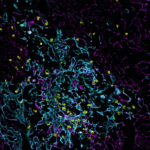Usually the immune system can distinguish our own tissues from invading microbes, and respond appropriately, killing the microbes or infected cells but not harming uninfected or otherwise healthy cells. Defective control of the immune response, leading to misdirected, excessive or inadequate immune responses, underly many immune disorders.
Inflammatory disorders occur when the immune system causes excessive inflammation that damages the body. This may be triggered by an infection, such as in rheumatic fever or occur for no known reason, such as in inflammatory bowel disease.
Autoimmunity is a type of inflammatory disorder that occurs when the immune system mistakenly attacks the body’s own tissues. These disorders are caused by lymphocytes or antibodies reacting to the body’s own tissues.
Significant autoimmune diseases include:
Allergy occurs when the immune system over-reacts to harmless factors in our diet or environment.
Immunodeficiency is a weakened immune system. This causes a person to be infected by microbes more easily than a healthy person.








